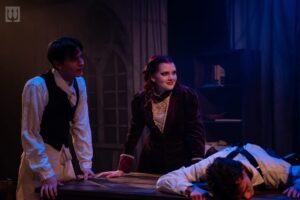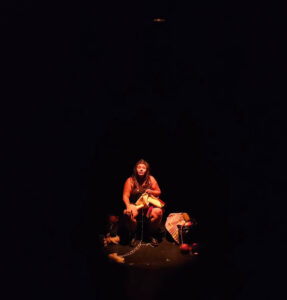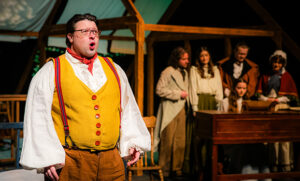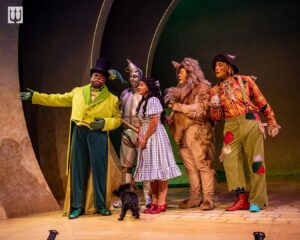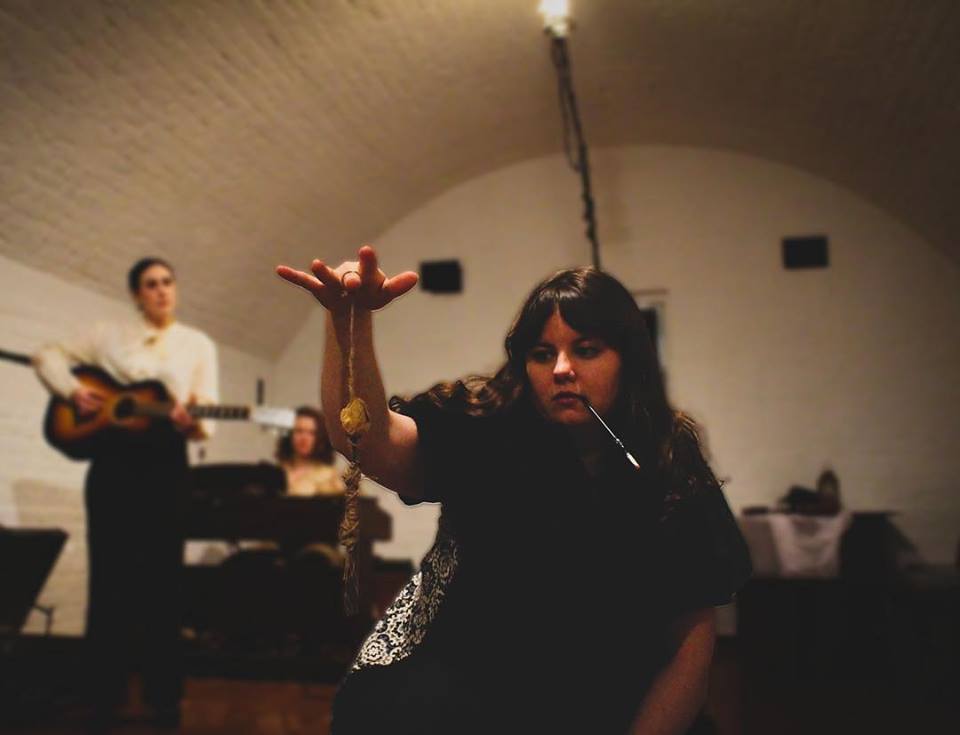
In early February Halifax’s newest theatre company, Steady Theatre Company, burst onto the scene with their imaginative and dynamic production of William Shakespeare’s MacBeth, staged in one of the tiny old army barracks rooms within Citadel Hill.
On a brutally cold Saturday afternoon, the wind howling across the open space inside the Citadel, a small audience huddled on wooden chairs, in the round, listening to fiddle and piano tunes in a cozy warm room in anticipation of a play. Halifax’s military history hangs close when you’re within these walls, which immediately set an ideal tone for a play about a Scottish general’s lust for power. There is also a long history of plays having been performed by soldiers in these garrisons, which rooted this production beautifully in the theatre history of Halifax, alluding to both an enduring tradition, but also highlighting how societal and theatrical conventions have changed.
The intimate nature of the space also lent itself beautifully to the nuanced performances from this cast. Michael Kamras and Abby Weisbrot root MacBeth and Lady MacBeth deeply in their humanity. Kamras’ MacBeth is initially intrigued, but cautious, about the Weird Sisters’ prophecy of his political future, and he approaches the demise of King Duncan with a sense of appalled hesitance. While he continues to grow bolder and more ruthless as the play progresses, he never becomes a caricature of evil, but continues to be a fallible man, inflated by ego, and haunted by paranoia: unable to stop the parade of death he’s initiated. Lady MacBeth’s call to, “unsex me here, And fill me from the crown to the toe top-full Of direst cruelty” is much less a maniacal invocation here, but rather a quiet plead. Her madness too is subdued, something inside her has broken under the strain of that cruelty she thought she wanted so badly. The direction that Kamras and Weisbrot have taken these characters is exciting to see, it’s fascinating to see MacBeth and Lady MacBeth presented in a more contemporary way, as a couple making horrific mistakes, closer to Francis and Claire Underwood than the more heightened and mythic tragic figures of Ancient Greece. There’s room for both Kamras and Weisbrot to push even further into exploring their characters’ relationships with others: to give us a stronger sense how MacBeth and Lady MacBeth’s relationship changes over the arc of the play, as well as to really delve into the relationship between MacBeth and Banquo.
Frietzen Kenter, Jessy Matthews and Sophie Schade play both the Weird Sisters and the Murderers, a wonderful doubling of casting. Often the Weird Sisters are played underneath heaps of fancy costumes, makeup, prosthetics, and tricks of lighting and special effects, so I especially appreciated seeing these interesting characters coming to life purely from the physicality and the talents of the actors. There was a magnetic sense of play present here, which at times reminded me of scenes of Madam Mim from Disney’s The Sword in the Stone (1963). There is a lovely layering in this production of the tragic, the supernatural, and the silly. Genny Dow plays Malcolm as a very young leader-in-waiting, which adds to Malcolm’s vulnerability and his decision to flee Scotland after the murder of his father. It also shows the precariousness of Scotland’s future, which is highlighted in an unexpectedly hilarious exchange between Malcolm and Sam Vigneault’s MacDuff where Malcolm lists all his potential shortcomings. It’s also a bit more historically accurate, as the real King Malcolm II was only nine when his father was killed. Stepheny Hunter also brings levity to the play with her portrayal of Hecate, the ruler of the three witches, who berates them for being cast aside in their dealings with MacBeth. Hunter brings 110% energy to her monologue and creates a unique character that adds to the sense of playfulness in this production.
As evocative as the venue at the Citadel is, it presents numerous challenges for director Julia Schultz, but she really grabs every opportunity she can find in the space and runs with it. The use of the outside door (which sent real frigid wind billowing inside every time it was opened) contributed beautifully to the moments in the play grounded in realism. The banging on the heavy outer door also helped build the eerie, ghostly, and ominous ambiance, while the use of light in the fireplace highlighted the room’s ability to be snug. One of my favourite choices was the Scottish ceilidh that marked Duncan (Kya Mosey)’s visit to MacBeth’s house, peppered with folk songs that would be familiar to many Nova Scotians. The reveal of Banquo’s ghost (Peter Sarty) was done in a very unique way, and similarly, there was a terrific final cauldron scene, again all largely done with the physicality of actors rather than relying on effects. The strong command of the language by all the actors was also impressive.
One thing I was curious about was the choice of costumes. It seemed like the play was set around the Edwardian period, and there were moments where there was a real sense of MacBeth existing within a separate performance piece, as Hunter and Sarty also played British caretaker characters, which also connected to the Citadel’s garrison theatre history. I wanted to know more clearly about this aspect. Were we seeing performances by soldiers during World War I? Was the play being set during World War I? And how does the period in which the play is set connect to the politics of today?
This was a very strong first show by a very young theatre company. It is full of imagination, fun, ingenuity, and boldness. I’m already looking forward to their next production.
MacBeth had a sold-out run has since closed.
You call follow Steady Theatre Company on Facebook and Instagram (@SteadyTheatreCo).

